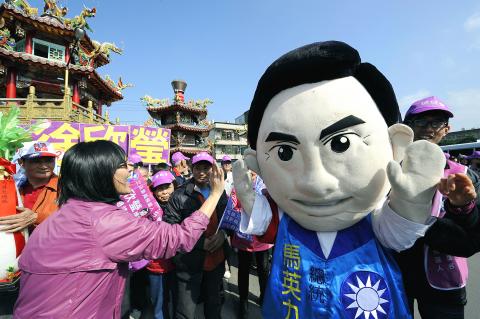Attempting to consolidate support in pan-blue strongholds in the final days of the presidential election campaign, President Ma Ying-jeou (馬英九) yesterday drew a passionate response in New Taipei City (新北市) and Hsinchu County, as residents lined up on the streets to cheer his motorcade.
His appearance at traditional markets also caused a stir.
Supporters crowded by the roadside to shake hands with the president, who is seeking re-election, or to take a photo of him, amid chants of “Re-elect Ma Ying-jeou!”

Photo: Toshifumi Kitamura, AFP
However, his momentum has been slowed by the lukewarm response he received in central and southern parts of the country.
During his motorcade campaign in Chiayi, Yunlin and Changhua counties on Saturday, cheering from residents who came out on the streets was sporadic at best.
In cities where the Democratic Progressive Party (DPP) enjoys strong support, Ma was often confronted by supporters of DPP presidential candidate Tsai Ing-wen (蔡英文) who gave him the thumbs down or shouted: “Tsai Ing-wen dong suan [凍蒜, which means “get elected” in Taiwanese, also known as Hoklo].”
The progress of Ma’s motorcade was shadowed by numerous giant campaign bulletin boards featuring Tsai and local legislative candidates.
Even at the large-scale nighttime campaign party in Changhua on “Super Saturday,” for which the Chinese Nationalist Party (KMT) mobilized 50,000 supporters, the crowd did not fill the outdoor space across from Ma’s local campaign headquarters, with many seats left vacant.
Although campaign momentum and popularity at rallies do not necessarily reflect voter turnout, Ma’s loss of momentum is notable, especially compared with Tsai’s growing popularity, even in traditional pan-blue strongholds.
Ma obtained a solid victory in the presidential election four years ago against the DPP’s Frank Hsieh (謝長廷), defeating his opponent by 2 million votes.
However, he has faced a tough battle against Tsai since the beginning of his campaign.
Ma’s top aide, executive director of Ma’s re-election campaign office King Pu-tsung (金溥聰), said KMT internal polls suggested Ma has taken a steady lead over Tsai and said the camp would stick to its original campaign strategy in the final stage of the campaign.
The close race has caused concerns not only in Ma’s camp, but also among many pan-blue supporters.
Boonie Wu, a 54-year-old Taiwanese American who has returned to Taiwan to vote on Saturday, is one of the worried supporters.
Waving Ma campaign flags on Ketagalan Boulevard in Taipei at the campaign rally organized by Ma’s camp on Sunday, Wu said she and her friends felt the need to attend the event and show their support.
“I have confidence in President Ma, but me and my friends are quite nervous this time. It would be a lie if I said I am not worried,” she said.
Sunday’s rally in Taipei attracted more than 250,000 supporters, according to the KMT, who crowded Ketagalan Boulevard, and were eager to show their support for Ma as he struggled to stay ahead in the presidential campaign.
KMT spokesperson Lai Su-ju (賴素如) acknowledged that the presidential race is a challenging one, but said the great turnout on Sunday reflected a sense of crisis among pan-blue supporters in this election, which he hoped would translate into voter turnout on election day.

Chinese Nationalist Party (KMT) Chairman Eric Chu (朱立倫), spokeswoman Yang Chih-yu (楊智伃) and Legislator Hsieh Lung-chieh (謝龍介) would be summoned by police for questioning for leading an illegal assembly on Thursday evening last week, Minister of the Interior Liu Shyh-fang (劉世芳) said today. The three KMT officials led an assembly outside the Taipei City Prosecutors’ Office, a restricted area where public assembly is not allowed, protesting the questioning of several KMT staff and searches of KMT headquarters and offices in a recall petition forgery case. Chu, Yang and Hsieh are all suspected of contravening the Assembly and Parade Act (集會遊行法) by holding

PRAISE: Japanese visitor Takashi Kubota said the Taiwanese temple architecture images showcased in the AI Art Gallery were the most impressive displays he saw Taiwan does not have an official pavilion at the World Expo in Osaka, Japan, because of its diplomatic predicament, but the government-backed Tech World pavilion is drawing interest with its unique recreations of works by Taiwanese artists. The pavilion features an artificial intelligence (AI)-based art gallery showcasing works of famous Taiwanese artists from the Japanese colonial period using innovative technologies. Among its main simulated displays are Eastern gouache paintings by Chen Chin (陳進), Lin Yu-shan (林玉山) and Kuo Hsueh-hu (郭雪湖), who were the three young Taiwanese painters selected for the East Asian Painting exhibition in 1927. Gouache is a water-based

Taiwan would welcome the return of Honduras as a diplomatic ally if its next president decides to make such a move, Minister of Foreign Affairs Lin Chia-lung (林佳龍) said yesterday. “Of course, we would welcome Honduras if they want to restore diplomatic ties with Taiwan after their elections,” Lin said at a meeting of the legislature’s Foreign Affairs and National Defense Committee, when asked to comment on statements made by two of the three Honduran presidential candidates during the presidential campaign in the Central American country. Taiwan is paying close attention to the region as a whole in the wake of a

OFF-TARGET: More than 30,000 participants were expected to take part in the Games next month, but only 6,550 foreign and 19,400 Taiwanese athletes have registered Taipei city councilors yesterday blasted the organizers of next month’s World Masters Games over sudden timetable and venue changes, which they said have caused thousands of participants to back out of the international sporting event, among other organizational issues. They also cited visa delays and political interference by China as reasons many foreign athletes are requesting refunds for the event, to be held from May 17 to 30. Jointly organized by the Taipei and New Taipei City governments, the games have been rocked by numerous controversies since preparations began in 2020. Taipei City Councilor Lin Yen-feng (林延鳳) said yesterday that new measures by